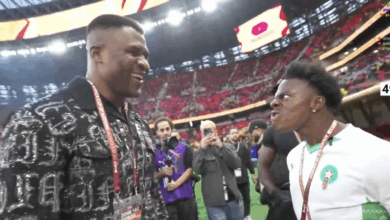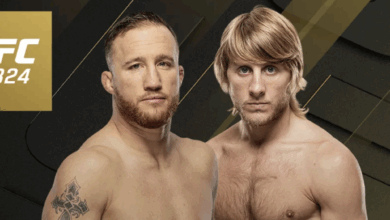Exclusive: Is Boxer J-Rock Williams Philly’s Next Fresh Prince?

Julian “J-Rock” Williams sits on a silver sofa in a tinsel-adorned lobby of a downtown LA hotel, a copper-colored (fake) plant in front of him, a 15-foot-tall (fake) tree behind him, beautifully wrapped (empty) presents spread on the floor. Gold baubles hang everywhere.
J-Rock nearly mixes in, with his wide, ingenuous grin, soft-spoken manner and the full-red track suit he’s rocking Chas Tenenbaum-style. But then you ask him what the greatest mistake of his life has been.
“Not spending enough time with my mother before she passed,” he says.
And the facts of the man come rushing back to you again: He’s 26, once-bereaved, formerly homeless, from the streets of West Philadelphia. A technical, powerful, undefeated junior-middleweight. He’s in La-La-land for one reason only, and it’s got nothing to do with the upcoming musical of the same name starring Ryan Gosling and Emma Stone.
He’s gonna get that title Saturday night, when he enters an arena on the campus of USC – though he never considered attending college as a teen –and faces belt holder Jermall Charlo live on Showtime. No matter that Charlo’s the same age, also undefeated, advised by the same boxing eminence gris, Al Haymon.
J-Rock loves him some “Fresh Prince of Bel-Air” (earlier in the day, another reporter even asked him to recite the theme song lyrics) and Martin Lawrence’s eponymous show in the ‘90s. He digs the sounds of Rick Ross and Meek Mill. If he makes some money and he wants nice shoes, he turns to Italian brand Balenciaga. His dream sponsorship? Bentley – boy he’d love to pilot a pimped-out GT with the Flying B statuette on top of the car’s grille.
But entertainment, commercial aspirations – these are subjects I brought up, on my own gold-covered couch in the lobby. He’s the one who brought up his two-year-old daughter and the pain of not seeing her when he travels for boxing and the elation of picking her up from school when he’s home. He’s the one who’s making up for lost time with his mom by devoting more time to hanging with his siblings and communing with his dad.
If you spent 10 years working on a book about Philly boxers as I did, you meet J-Rock and you love him. Dude won Philly’s award for best boxer last year, which comes with a statuette of great ‘70s Philly middleweight Bennie Briscoe. J-Rock knows who Briscoe is – he’s researched not only the greats from his own city but every bit of footage he’s been able to get on current opponents and future rivals.
Before his last bout, against obscure Italian pug Marcello Matano, he told the media inside his Philly gym that he knew Matano so well, he could tell you what toothpaste Matano uses in the morning. Then he knocked the Italian out in 7 – forcing the champ to fight him after seemingly years of delay, because now J-Rock was the mandatory challenger.
And any kid who’s ever waited for a roller-coaster can tell you: That feeling when you get to the front of the line may be a mixture of apprehension and giddiness but it’s above all one of validation. Whatever the trial, my turn has come to submit to it – and then bend it to my will.
The worst damn thing a sports announcer can say to fans is ‘savor this moment, we’ll never have quarterbacks like this in the league again; or swimmers like that in the pool; or technicians like that in the ring.’
The statement might be totally true and the sentiment sincere, but we can’t rewire ourselves to appreciate what we already have. Humans are yearning creatures – sparked not by satiety but by hope for more. We didn’t keep branding kids the next Jordan because Jordan himself was leaving us, and the role needed to be filled HR-style. Hell, Harold Miner was labeled “Baby Jordan” while Mike still played (#1995DunkContestChamp).
We look for the next great thing because we’re captivated by imagination. What if someone could hang in the air longer than Jordan, what if someone could gun the ball half a football field from his ass (#JamarcusRussell), what if someone could blitz Mayweather with shots so rapid his shoulders couldn’t shrug ‘em off in time?
Guys like Elon Musk dream of automating cars and traveling to Mars. Sports fans dream of 18-year-old midfielder Cristian Pulisic becoming America’s first global soccer star – of 22-year-old Shohei Otani becoming the next Babe Ruth (yeah, the 6’4” stud pitches and hits: his fastball touches 101.9 mph, his batting average .322).
We dream up a better scenario and a strategy or rooting interest that’ll take us there. Or as the Olympic slogan puts it: “Citius, Altius, Fortius.”
Julian “J-Rock” Williams sparred with Mike Jones to prep for his junior-middleweight title fight this Saturday night in LA and live on Showtime.
You don’t know this Mike Jones, but in an alternate reality, you might. Jones was a power-punching Philly prospect a decade ago. An incredibly tall and powerful welterweight, he mowed down opponents on his way to a 2012 title fight in Vegas. Sure, there were hiccups – fights in which Jones was given the benefit of the doubt by judges. There were harbingers of what was to come, too: His inability to switch from offense to defense fluidly, the length of his long right hand – which he couldn’t throw straight but only in an overhead loop. The time his step-sister told me Mike needed real therapy for his inability to cope with loss (he had temporarily distanced himself from family after his parents divorced and then again after his uncle died).
Still, Jones was expected to win his title fight in 2012 against an old, shriveled power puncher. And for 10 rounds he did exactly what he needed to – nothing exceptional, but enough to win on points. Then he was clocked with an uppercut in the 11th, KO’d, and his whole life spiraled apart. Unable to deal with the idea that he was not invincible, forced to confront a loss on a record he valued too highly, like it was god’s book report of his life, he fled his hometown of Philly, cut himself off from his managers, promoter and friends and settled into a totally new and anonymous existence in Las Vegas – town of the gamblers whose losses force them never to return but to stay and wallow.
The break was so severe that only through his lawyer could acquaintances speak to Jones – myself included – and that lawyer later told me, after he, too, lost track of Mike, that yeah, the man was haunted by a mere athletic loss and so he had become a ghost in turn.
This is just one of the guys J-Rock Williams sparred with in Shuler’s Gym in Philly to prep for Saturday’s title fight. Still, the question had to be asked – what if J-Rock lost an exchange or even a round in a fight that Vegas sports books call even? Would he have the resilient spirit – a star’s forgetfulness – to move past whatever mistakes were made and start the fight anew?
“Yes,” he said. And he tried to tell me that Mike’s anguish derived not from the loss so much as the way it happened – a KO that physically laid him out on canvas, that took a giant, muscular man and rendered him supine and helpless. But J-Rock also said he could see the lingering thoughts of that moment in Mike’s eyes, while Mike – whom I’d personally love to chat with – hell, we once watched a Bruce Lee movie together – still travels between Vegas and Philly, sparring with kids who still have the nerve to risk themselves in official combat.
I don’t bring up Mike to cast doubt on J-Rock. Rather to highlight the possible effects of the way the latter has been trained. Since J-Rock turned pro, he has been coached by Stephen “Breadman” Edwards, who’ll readily confess to a harsh and shrill form of training reminiscent of Ann Wolfe’s. The verbal cascade is so intense that Breadman actually felt guilty training J-Rock after the passing of the latter’s mother. How could he say such nasty things to a man in mourning?
But it’s Breadman’s way and it has worked in the pro ranks so far. When asked in a hotel conference room today whether J-Rock actually appreciates such treatment, Breadman shrugged and told me to ask the kid. So I shouted to J-Rock: ‘Do you like training?’ And he replied: “No, I like fighting.”
A healthy and successful relationship so far – but because of my history with Mike Jones and now J-Rock’s link to him, you just hope J-Rock is able to keep his spirits up should a round not go his way. That he has the deeper understanding that fights are won and lost at multiple points. No one exchange will define the encounter – unless it’s a KO. And even then, if you’re healthy still, you have a full life ahead of you.
For a real observer of boxing, the fight game is everything. But for a fighter, it can only be 99 percent. The other one percent is a consideration of time. “That’s the one thing we can’t get back,” Julian said to me when discussing his departed Mom. By the same token, he believes – for the moment – that his time is very much now – but also tomorrow and next year and the year after that. An enviable mental state – you just hope the well-intentioned Breadman keeps him there, pushes him to the edge but never inadvertently further.
J-Rock should win – though my analysis may be highly biased. But he’s fast, maintains an excellent jab and a torpedo right, he’s a cagey infighter when combatants smother each other, and he has the patience to soften a guy up before removing him – rare for someone so explosive.
But our greatest strengths can be weaknesses, too. At full extension, J-Rock generates his power, but the extension is also the problem – his straight shots go long – he doesn’t throw them overhand but he does throw his back into them, like a drop-and-drive pitcher. In boxing parlance, he falls in with his shots – where his arms go, his torso and legs follow. If an opponent feints him into it and backs up a step he’ll have position over J-Rock as J is spread forward, parallel to the floor. Then it’s one knock to the back of the noggin and J-Rock goes down.
But if Julian connects while falling in, forget it – the punch will carry the full weight of his body, same as Babe Ruth’s swing did his (watch the tape – Babe Ruth stood in the box with his feet together, and then collapsed into a pitch like felled timber).
After my interview with him, J-Rock hit up a nearby Zara for retail therapy. He has nothing to occupy him these last, long days before his title challenge – his weight is already what it should be (though he buys groceries from Whole Foods, he has a chef prepare several small meals for him throughout the day – so he has something ready after his run or after his workout and he doesn’t have to resort to something cheap because he’s so damn tired from the work).
The guy conducts film study along with his own training. No, he couldn’t name his current opponent’s toothpaste when I quizzed him. But he laughed and with a smile said it’s okay – he knows everything else.




